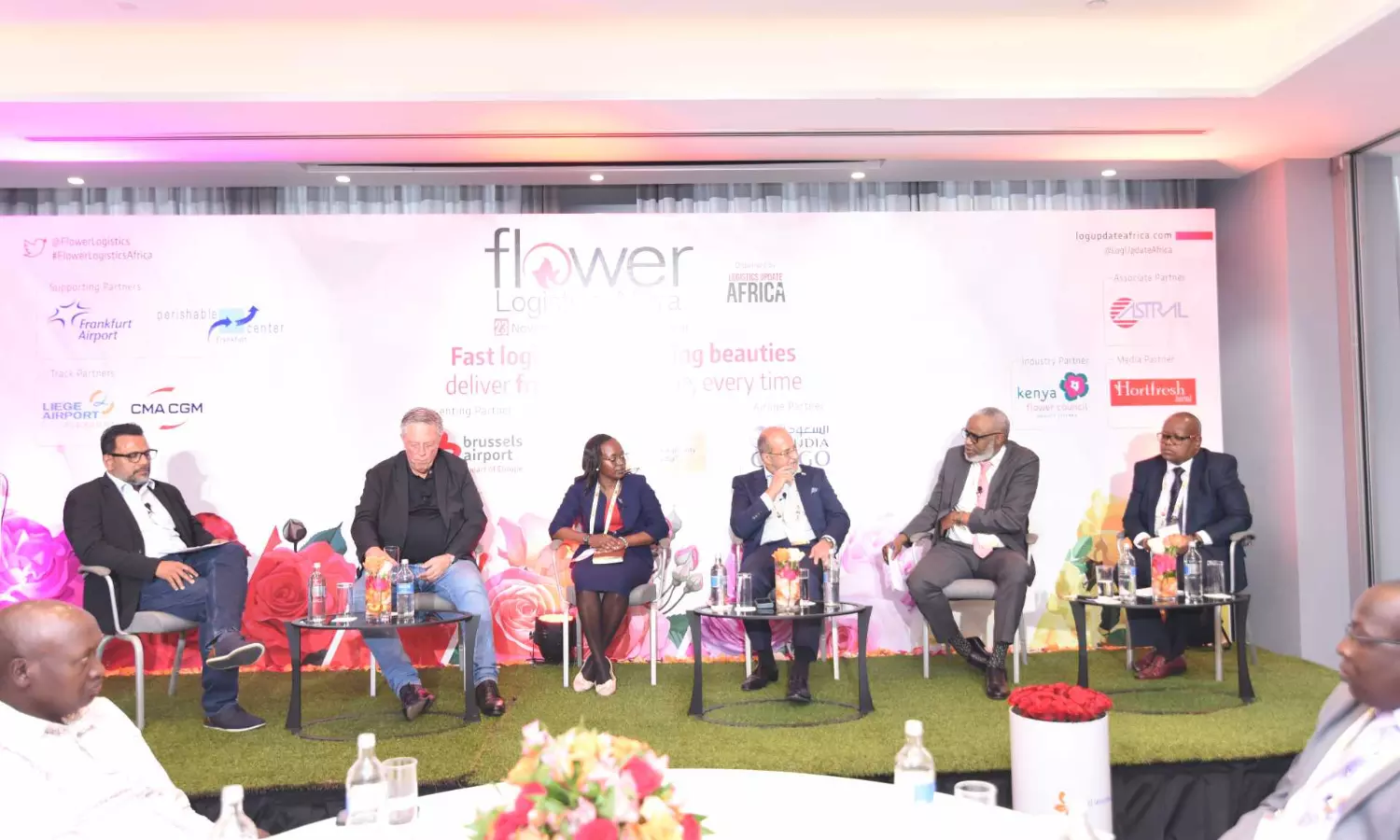African flower logistics checks into 'future mode'
The fifth edition of the 'Flower Logistics Africa' chalked out the new, post-pandemic normal for the flower logistics industry of Africa with day-long deliebrations on the ever-evolving nature of air cargo, the feasibility and emergence of sea route and African industry's response to the two megatrends of sustainability and digitalisation

A panel discussion on 'The new normal for flower shippers of Africa after the pandemic' underway, at the fifth edition of the ‘Flower Logistics Africa’ held in Nairobi on November 23
The fifth edition of the 'Flower Logistics Africa' got off to a smashing start with over 25 speakers holding forth on all things flower logistics and Africa, at the heart of the flower logistics industry, in the Kenyan capital of Nairobi on November 23.
The event will be followed by Perishable Logistics Africa(PLA) conference on November 24 at the same venue. This year, Brussels Airport, one of the most important centres of economic growth in Belgium and a key air cargo gateway to Europe, presents the two-day conference. The two-day shipper-centric event, organized by Logistics Update Africa, a STAT Media Group publication, was being held after a gap of three years because of the global lockdowns owing to the Coronavirus pandemic.
The FLA event themed 'Fast Logistics for Fleeting Beauties: Deliver Freshness on time, every time' saw a smattering of growers, shippers, freight forwarders, airlines, airports and flower authorities, and local industry bodies and associations in attendance. The industry association Kenya Flower Council (KFC) has been the industry partner for FLA since its first edition in 2016. Kenya Airports Authority was the platinum partner for the event and Saudia Cargo was the airline partner, and Frankfurt Airport and Perishable Center Frankfurt were the supporting partners for the event.
The first panel titled 'The new normal for flower shippers of Africa after the pandemic' deliberated on the changes and challenges facing the flower shippers of Africa after the pandemic and how the air freight capacity constraints and volatile freight rates affected the shippers and the industry in general.
The panel was followed by a presentation by Lina Jamwa, Membership, Advocacy, and Communications Manager, Kenya Flower Council, where she gave an overview of the Kenya floriculture industry and The Kenya Flower Council; bottlenecks affecting the competitiveness of the industry, sea freight as a solution to logistics issues in the industry and KFC's role in the promotion of sea freight and the future of sea freight
The event saw an interactive session followed by a slew of presentations by Josiah M Syanda, Deputy Director, Phytosanitary Services, KEPHIS (Kenya Plant Health Inspectorate Service), and Sam Quintelier, Cargo Business Development Manager, Brussels Airport.
The second panel deliberated on the topic, "Can airport community collaboration eliminate weak links, resort in a more efficient fresh corridor with digitization as the ultra-enabler?' and highlighted how airports can anchor and create cargo communities that will enable collaboration across the value chain and offer value additions to shippers.
The second part of the event began with Jeroen van der Hulst, Owner and Founder, FlowerWatch giving a presentation on 'Air cargo as a premium mode of flower logistic: value and footprint reduction to be unlocked'.
This was followed by the third panel, which was on 'Delivering freshness on time, every time – the digital dynamics of flower logistics' and led deliberations on how digital transformation is key to visibility in the flower industry and how it can thrive in the digital era, which is being called 'Logistics 4.0'.
Parit Shah, the owner of Silpack Industries Limited presented his observations in his presentations on 'The 3Rs – reduce (weight), reuse and recycle – of packaging to build sustainability in flower logistics ' followed by another presentation by Daniel Sepetu, DGM, East Africa Cluster, CMA CGM which gave the attendees 'Insights on the development of sea freight of flowers from Kenya'.
The fourth and final panel of the day deliberated on the subject 'Is ocean freight a reliable alternative mode to air for African flower exporters?'. With air freight prices on a high, flower exports in Kenya have been slowly but steadily taking the sea route.
The two conferences in Nairobi are slated to act as a global networking platform for regional and international service providers involved in the cold chain, logistics and packaging solutions, shippers, producers, and transport providers to connect the gap between the supply chain and logistics business.


